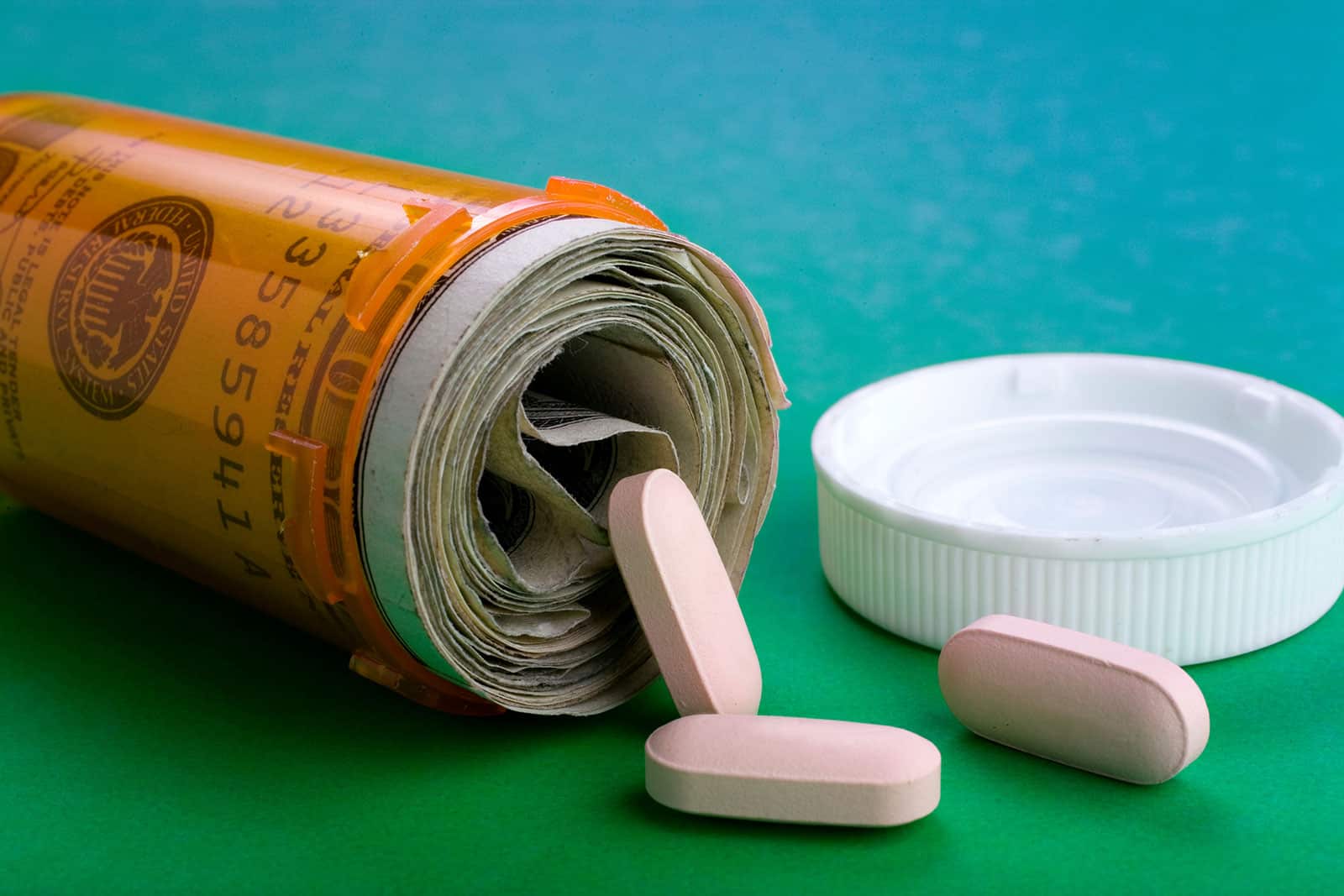The cost of drug or alcohol detox is determined by the needs of the client. Some facilities are prohibitively expensive. Others provide treatment for free.
Regardless of financial circumstances, detox treatment options are available for everyone. If you want to let go of addiction but you can’t do it alone, there are plenty of caring and knowledgeable professionals who can help you succeed.
Table of Contents
- 1 Determinants of the Cost of Detox
- 2 What’s the Difference Between Medical Detox and Medication-assisted Treatment (MAT)?
- 3 Cost Versus Safety
- 4 Outpatient Versus Inpatient
- 5 The Cost of Medical Detox
- 6 Is Medical Detox Tax Deductible?
- 7 Financial Resources For Drug and Alcohol Treatment
- 8 Additional Costs of Detox
- 9 Detox Versus Withdrawal
- 10 What Is Rapid Detox?
Determinants of the Cost of Detox
The cost of a drug or alcohol detox will depend on a multitude of variables, Those variables can include:
- The drug you’re detoxing from and how long you’ve been taking it
- Your current insurance coverage
- Previous drug or alcohol treatment
- The type of care you require
- The severity of your addiction
- Location and amenities of a detox facility
What’s the Difference Between Medical Detox and Medication-assisted Treatment (MAT)?
Medical detox cleanses the body of substances and treats acute intoxication. Medication is prescribed to relieve the discomfort of withdrawals. By contrast, MAT is an intervention that combines medication with therapy.
Cost Versus Safety
Drug detox is available on an inpatient or outpatient basis. Many people choose outpatient because it’s cheaper than inpatient by a significant margin.
Detox is an uncomfortable process no matter where you do it. The only upside is that it probably won’t kill you. On the other hand, people with an alcohol or benzodiazepine addiction can die during a detox if it’s not performed properly.
These clients should only be detoxed as inpatients with 24/7 medical monitoring. To ease the distress of the detox, your healthcare provider may prescribe medication to lessen the pain and help you relax.
Treatment facility insurance professionals are highly skilled at navigating the complex world of medical insurance companies. These wizards can ensure that you receive all the financial assistance you need to make a successful recovery.
Outpatient Versus Inpatient
Both types of detox are effective. Outpatient detox costs less than inpatient detox and works best for those with mild to moderate addiction.
Inpatient care works best for clients with serious, long-term addiction who have no family or support group. Inpatient care allows these clients to experience a high level of interaction with caregivers.
Clients with milder addictions and support systems already in place typically don’t require inpatient detox. They are most likely to benefit from outpatient care instead.
If you need inpatient detox, you can sell yourself short by insisting on outpatient care. If your only motivation is to save money, you are likely to short-change yourself instead.
Inpatient care might cost more, but it’s also a safer option. Researchers have found that clients who opt for inpatient detox have better treatment outcomes overall than clients in outpatient care.
Medical detox is appropriate for individuals detoxing from alcohol, heroin, morphine, methamphetamine, prescription painkillers, fentanyl and benzodiazepines.
Detoxification is just the beginning of a lifestyle built on recovery. After the drugs are excreted and the body is stabilized, clients can begin to heal on the mental, emotional, physical and metaphysical planes.
There’s just one problem. You can’t build a new life of recovery if you’re still out there using. Detox is the first stage of the recovery process, and recovery is based on abstinence.
The Cost of Medical Detox
The cost of detox depends primarily on how long you stay at a facility and how much care you need while there. Inpatients and outpatients alike typically spend about one week in detox or somewhere between 5-14 days.
Outpatient detox is less structured than inpatient, and care includes only treatment. It does not include meals or transportation to and from the program.
A three-month outpatient program can cost between $5,000 and $10,000. As with inpatient detox, the overall cost of outpatient care reflects the needs of the client, how much care is required and how often a client visits the facility.
The total cost of an inpatient detox program with a 30-day, 60-day or 90-day stay could cost you between $12,000 and $60,000. Inpatient detox programs include meals, medication, supervision, laundry and lodging for the duration of a stay.
Inpatient detox is a good option for people who need constant medical supervision due to preexisting conditions or serious side effects from the detox. These clients tend to stay in detox a bit longer with the average stay being nine days.

How much does Detox cost?
All insurance plans are different, and they have different criteria for the services they cover. Your doctor and treatment provider will submit detailed assessments of your current condition.
They will explain to the insurance company why you require specialized care. The more thorough the assessments, the more likely you are to get the coverage you need.
If the detox involves potentially dangerous side effects and the client is being closely monitored, it will drive up your detox costs. Fortunately, most inpatient facilities include detox in the total cost of their programs.
Is Medical Detox Tax Deductible?
The cost of inpatient detox may be tax-deductible if you meet certain filing requirements. Although the amount you can claim will depend on a variety of conditions, your out-of-pocket expenses must be more than a certain percentage of your current income.
Financial Resources For Drug and Alcohol Treatment
- Private insurance
- VA insurance for the military
- Private payment
- Payment plans and installments
- Medicaid and Medicare
- State and government funding
- Non-profit detox facilities
- Financial aid
- Options for those with low income
- Free programs
Even if you don’t have insurance, you can still get the help you need. Some facilities have a sliding scale for low-income clients. Other treatment providers offer detox services free of charge.
The Salvation Army provides free rehab for those in need. There are also some state-funded programs serving low-income people. Some treatment centers offer payment plans or financing options that give you access to immediate care.
Additional Costs of Detox
Lodging
The cost of a drug detox is partially determined by the facility itself. As a general rule, the fancier the facility, the more it will cost. First-class accommodations can add up to thousands of dollars per day, although most rehabs cost significantly less.
Amenities
Amenities like a state-of-the-art fitness center, shared office space and a 5-star chef can be meaningless if you’re in the throes of a medical detox. There’s no point in spending a fortune on beautiful surroundings when you’ll be too uncomfortable to enjoy it.
On the other hand, little extras like massage, acupuncture, swimming and tennis can relieve the discomfort of detox.
Location
The higher the cost of living in the place where you detox, the more you’ll pay for your care.
The number of treatment options available
The more treatments you receive and the more options a detox facility has to offer, the more expensive your care will be. Therapy sessions and professional counseling can raise the cost of care even more.
Detox Versus Withdrawal
Detox and withdrawal are not the same thing. Detox is a process by which the body rids itself of addictive substances. Detox facilitates the process of withdrawal, and withdrawal is what you feel while your body cleans itself out.
During an inpatient medical detox, your body is weaned from an addictive substance in a medically controlled environment. The detox is performed under close supervision by a professional caregiver.
Outpatient detox involves only regular visits to an outpatient treatment facility for medical monitoring. Clients return home at night.
Medication is used to manage withdrawal symptoms during detox. Withdrawal won’t kill you, but the symptoms can be distressing. Antidepressants can relieve feelings of sadness and depression that sometimes develop during opiate and opioid detox.
Suboxone (bruprenorphine and naloxone) and methadone can both relieve opiate and opioid withdrawal symptoms either temporarily or on a daily maintenance schedule.
Benzodiazepines reduce arousal in the central nervous system and create a relaxed state in the client. Benzodiazepines can be used to mitigate a variety of withdrawal symptoms including these:
- Panic attacks and PTSD
- High anxiety
- Insomnia
- Paranoia
- Muscle spasms
- Seizures
- Hyperexcitability
- Alcohol withdrawal
What Is Rapid Detox?
It may be fast, but rapid detox is also expensive. A brief stay in a treatment center can cost you about $10,000. You’ll have to pay for it yourself because the insurance companies won’t touch it.
Rapid detox has been touted as a safe and effective treatment that cures addiction almost on the spot. The treatment has been described as a miracle cure that’s speedy, painless and foolproof. Nevertheless, a recent study revealed no credible evidence that rapid detox gets rid of addiction.
Subjects treated with rapid detox showed no improvement in the rate of relapse and reported a greater number of adverse events. They also reported feeling more uncomfortable after detox than before. Twenty percent of the rapid detox group remained in treatment while 24% of the traditional treatment subjects continued to receive care.
At NJ Addiction Resources, we help people get help in New Jersey. Say goodbye to addiction and ride the wave of recovery. We have everything you need to succeed.
FAQ
How much does rapid detox cost?
The cost for rapid detox treatment can greatly vary depending on the individual patient’s needs, the clinic, and the geographic location, among other factors. Prices could range from several thousand dollars to over $10,000. It’s important to note that many insurance companies do not cover rapid detox, as it is often considered experimental or risky by medical standards. This means that the cost might have to be covered out-of-pocket.
As it is now 2023, the costs may have changed due to various factors such as inflation, changes in the healthcare industry, or changes in the prevalence and treatment of substance use disorders. It is advisable to reach out to specific treatment facilities for the most current and accurate pricing.
Furthermore, it’s important to remember that while rapid detox may seem like a quick fix, it doesn’t address the psychological aspects of addiction. Comprehensive treatment involving behavioral therapy and ongoing support is typically the most effective approach to overcoming addiction.

